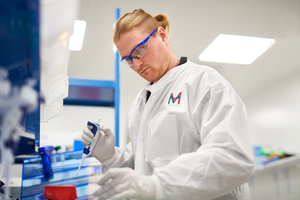- Sponsored Content
Biopharmaceutical Industry Calls on Vendors To Commit to a Greener Supply Chain

Chief executive officers (CEOs) and board chairs from Roche, GSK, and AstraZeneca are among seven signatories on an open letter calling for bioprocess suppliers to commit to specified climate and sustainability targets. Stating that the healthcare sector contributes about 5% of global greenhouse gas emissions, half of which comes from its supply chain, the authors call on their biopharmaceutical-ecosystem partners to move rapidly together toward a “greener, more efficient, and circular” process.
The letter is signed by representatives of big pharma companies as well as contract biomanufacturer Samsung Biologics. It urges suppliers to sign on to a set of joint, minimum climate and sustainability targets. Those are based on core commitments laid out by the same seven companies ahead of the 2022 United Nations Climate Change Conference in November of last year (1).
In short, those targets are
• to assess and disclose emissions by 2025
• to set near-term targets aligned with the 1.5-°C pathway of the Science-Based Targets initiative (SBTi) by 2025
• to reduce waste (including solvents) and energy and to reuse materials in manufacturing
• to switch to at least 80% renewable power by 2030 and make that commitment public
• to explore options for sourcing “green heat” by 2030
• (for transport suppliers) to make SBTi-aligned commitments by 2025 and include green transportation solutions in their core offerings by 2030
• (for all biopharmaceutical industry suppliers) to set such standards for their own suppliers
• to set targets for increasing water efficiency and commit to adopting water-stewardship standards.
This letter is the latest example of end users demanding greener supply chains to help achieve their own sustainability goals. In August of 2022, GSK (formerly GlaxoSmithKline) launched a sustainability program calling on its network of over 160 suppliers to take action on sustainability commitments and make improvements on emissions, energy, heat, transport, waste, water and biodiversity (2). The full letter is unedited below.
Burn, Buy, and Beyond |
The Open Letter
On Supplier Targets from Members of the Sustainable Markets Initiative Health Systems Task Force: The climate crisis is one of the most urgent risks to global health. The science is clear: There is a rise in noncommunicable and infectious diseases due to climate change, with seven million people dying prematurely each year from air pollution alone. At the same time, the healthcare sector contributes approximately 5% of global greenhouse gas emissions, with around half of this footprint coming from healthcare supply chains.
Joint action at scale is needed to move the needle. Driven by this urgency, we, as the global leaders of seven global biopharmaceutical companies, have united with the World Health Organization (WHO) and key public sector partners through the Sustainable Markets Initiative, to accelerate the transition to net zero, patient-centric health systems. As a partner to the WHO-led Alliance for Transformative Action on Climate and Health (ATACH), we also aim to share our knowledge, experience and positive contribution with ATACH partners and over 70 countries worldwide.
Healthcare supply chains must become greener, more efficient and circular. We must work across the value chain to decarbonise operations and do all we can to move away from fossil-fueled heat and power. Having launched a set of core commitments at COP27, we are scaling our impact above and beyond the actions we are taking within our own organizations. As part of this, we have set joint, minimum climate and sustainability targets for suppliers [that] aim to address emissions across the value chain and reduce the complexity of multiple asks.
These joint, minimum supplier targets are as follows:
�• Assess and disclose all scope 1 and 2; and 3.1, 3.2, 3.3, and 3.4 emissions by 2025 [see box above].
• By 2025, commit to set near-term targets aligned with the [1.5 °C] pathway (SBTi).
• By 2025, set targets to reduce waste (including solvents) and energy and reuse materials in manufacturing.
• Commit to switch to at least 80% renewable power by 2030 — excluding nuclear, and for biofuels, ensuring that feedstock meets sustainability criteria (including having low land use, land-use change, and forestry emissions) — and make commitment public. (Target may vary by market based on local market constraints.)
• By 2030, explore options to source green heat.
• Transport suppliers to make SBTi-aligned commitments by 2025 and include green transportation solutions in their core offering by 2030.
• Commit to set standards for [your] own suppliers.
• Set targets to increase water efficiency and commit to adopt water stewardship standards.
These supplier targets apply only to suppliers of the healthcare business of each private-sector member. In cases where our organizations have more stringent requirements than those laid out here, the more stringent requirement takes precedence. This letter is issued in compliance with relevant antitrust and competition law considerations.
As a valued partner, we urge you to sign up to these targets as a minimum and share them onward across your network. Shifting to net-zero, climate-resilient health systems cannot be achieved in siloes. We must collaborate, across the sector and across borders, to secure a healthier tomorrow.
Sincerely,
—Lars Fruergaard Jørgensen (CEO, Novo Nordisk)
—Belén Garijo (CEO, Merck KGaA)
—Paul Hudson (CEO, Sanofi)
—John Rim (CEO, Samsung Biologics)
—Severin Schwan (Chairman, Roche)
—Pascal Soriot (CEO, AstraZeneca)
—Emma Walmsley (CEO, GSK)
More on Sustainability from the BPI Archives Barbaroux M, et al. The Green Imperative: Part Two — Engineering for Sustainability in Single-Use Technologies. BioProcess Int. 19(1–2) 2021: 18–25; https://bioprocessintl.com/manufacturing/single-use/the-green-imperative-part-two-engineering-for-the-new-plastics-economy-and-sustainability-in-single-use-technologies. Nelson M. Zip Lipped on Sustainability but That Doesn’t Mean Biomanufacturers Aren’t Working on It. BioProcess Insider 24 October 2022; https://bioprocessintl.com/bioprocess-insider/regulations/zip-lipped-on-sustainability-but-that-doesnt-mean-biomanufacturers-arent-working-on-it. Gazaille B, Monge M. Intensified Bioprocesses: Uniting Productivity and Sustainability. BioProcess Int. ebook June 2023: https://bioprocessintl.com/multimedia/ebooks/ebook-intensified-bioprocesses-uniting-productivity-and-sustainability. Barbaroux M, et al. Driving Environmental Sustainability in the Biopharmaceutical Industry. BioProcess Int. 21(7–8) 2023: insert; https://bioprocessintl.com/sponsored-content/driving-environmental-sustainability-in-the-biopharmaceutical-industry. Gazaille B, Fahie B. Sustainability: Working Together Is Key. BioProcess Int. eBook May 2023: https://bioprocessintl.com/manufacturing/supply-chain/ebook-working-together-is-key-to-bioprocess-sustainability. |
References
1 Seven Pharma CEOs Announce New Joint Action To Accelerate Net Zero Healthcare. AstraZeneca: Cambridge, UK, 3 November 2022; https://www.astrazeneca.com/media centre/articles/2022/seven-pharma-ceos-announce-new-joint-action-to-accelerate-net-zero-healthcare.html.
2 GSK Launches Sustainable Procurement Programme for Suppliers. GSK: London, UK, 20 September 2022; https://www.gsk.com/en-gb/media/press-releases/gsk-launches-sustainable-procurement-programme-for-suppliers.
Based in Montpellier, France, Dan Stanton is founding editor of BioProcess Insider, part of Informa Connect Life Sciences; 44-7552-290-774; [email protected].
You May Also Like





